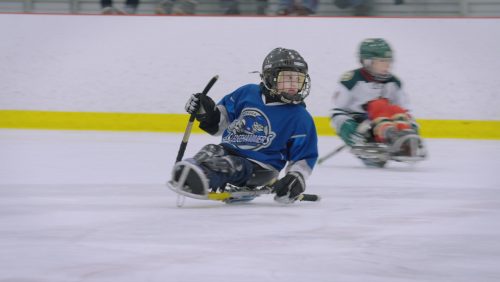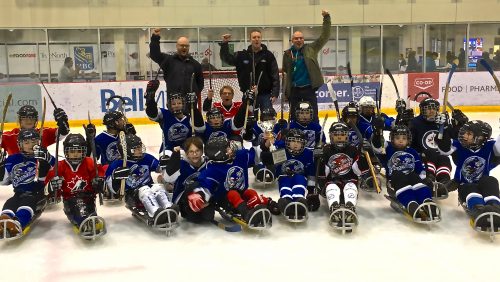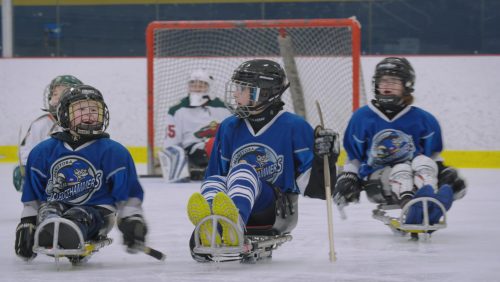In life, there are challenges that will make you or break you! We all have our limitations even if it looks like we’re always winning on the outside. Sometimes those challenges come from your career, relationships, debilitating accidents, finances or from birth. Although this world has evolved to try and accommodate everyone, we still have miles to go before the physically challenged population feels like an equal.
The new documentary film, The Tournament explores the sport of Sledge hockey, created out of the need for inclusivity and physical challenge. A fast paced competitive team sport that requires speed, agility, sharp eye/hand coordination and having to work together as a team to be the best. If you love hockey, you’ll love sledge hockey. It is the most exciting winter Paralympic sport to watch and the players consist of members with a physical impairment of the lower extremities. The Tournament is available to watch for free as of June 17 on NFB.ca
Having sports available to everybody is a game changer. We can’t all be artists after all and some of us need to explore our competitive side without restrictions. One filmmaker that understands this need more than most is Sam Vint. He made The Tournament documentary and two of his children are on the sledge hockey team that the film follows. One of the children is able bodied and the other, Isaac Vint has physical limitations, but don’t tell him that. Isaac, although young seems to be the heart and soul of the team and his passion for the sport is unmatched.
Sam Vint is an accomplished filmmaker and has been making films for a number of years. A life-long Winnipegger and a proud Métis, Sam Vint has performed various roles in the film and television industry, including research, sound, and camera. Sam’s work is deeply immersed in the issues facing Indigenous Canadians. He researched the NFB docudrama We Were Children, the APTN show The Medicine Line, and Going Native a new production airing soon on APTN.
Sam is currently focusing his attention on writing and directing documentaries, including Alice & Kevin, the story of a mother fighting for services for her disabled son on a remote reserve. His other documentary The Ken Ploen Way, about the life and career of one of the greatest players in CFL history is also in production.
The Tournament represents the intersection of his greatest passions—his children, the life-affirming power of sports, and telling a great story with an incredible team. Over the course of a weekend tournament, youth sledge hockey teams from the U.S. and Canada battle for supremacy. The Tournament is produced and distributed by the National Film Board of Canada (NFB). Producer, Alicia Smith is from the NFB’s North West Studio in Winnipeg.

“I watched the film this morning and I was so impressed with the camera shots. How were you able to accomplish the player POV?”
“That was an incredible cameraman, Tyler Funk. He used a gimbal and would bend over to capture it at eyelevel. He would get pushed in a sled at times, other times he’d go handheld or use a tripod. At times, Tyler would also use a smaller camera on the end of a boom pole to capture some overhead shots, he was always mixing it up. He had so much good footage it could’ve easily been an hour long documentary, the footage is really incredible.”
“Did you make this documentary to teach the public about the sport of Sledge hockey or was it to promote the benefits of sports in the physically challenged community?”
“When Isaac was younger, we’d stroll through the mall and people would stare at this little cute kid in a tiny wheelchair but it was always the look of sympathy and he’s really not that kid. He never understood the stares and he just wants a chance to do the same activities as other kids. He’s out there competing and sometimes a jerk or a bit obnoxious (laughing) but he’s out there. Sports are doing what they’re supposed to do, which is building relationships and communities. I’ve been involved in sports all my life and have never seen anything like the Para sports world. Everyone is pulling for each other and it really is what sports are all about. When they’re together in tournaments they really open up, because they are in the majority.”
“Did you have trouble asking permission to film the tournament?”
“When I reached out to the people of The Hendrickson Hockey Festival/Festival of Tournaments, they were amazing. It’s an amazing event and when I told them about the idea of a cameraman on the ice they immediately loved it. They told me I needed all the teams to agree to it, so I contacting them all and within a day they had all replied and they were all very excited about it.”
“In the film, your son Isaac meets an older sledge hockey player that he is in awe of. Is he a high level player?”
“Yes, his name is Danny Lilya and we ran into him at the first tournament, he was playing on one of the other teams. He’s played on the US Junior National team on defense. At the Sledge tournament you’ll get the best defensive players because they can really control the game. He was there because they never had the numbers and just kept the puck in their end without engaging too much, mostly because he’s a far better player than anyone else out there. On the last game and the last period, the puck got back to him at the blue line and you could see the look on his face, he took a shot and it rocketed into the top right corner from the blue line. My son and I were sitting on the bench and we both looked at each other with amazement. Isaac has always been enamored with Danny and he’s always been after me to play football but I had to explain that I didn’t think it was possible. One day he came into my room and asked if I thought he could play pinner in football. I told him it might be possible but we’d have to talk to the league. He then said, ‘then what about this?’ he had found a video of Danny playing pinner on his high school football team. Since then Danny has been a legend in our home and he’s a great kid.”
“Your son could be as good as Danny someday and also make it onto the national team. How old would he have to be?”
“For our sport you can be pretty young. The prominent female on our team, Elisa is now on the Canadian Woman’s National team and also the youngest member on the team. The men’s team is really competitive and made up of many members that had played hockey previous to getting injured, such as the player from the Humboldt hockey team; they have a certain skill set already. With Isaac, he’s born with it and is different; his tendons are thicker and he won’t get hurt as much, he’s used to being on his hands. I think he’s going to make the team at 16 (laughing). He’s a good athlete and he’s fierce.”

“How often do they practice?”
“Here in Winnipeg they practice once a week at the Jets practice facility called the Bell MTS Iceplex. They give us a sheet of ice for a day, so we’ll start working with the novice players to intermediate and then seniors before getting to the top players. It’s a full day of sledge at the rink every week.”
“The younger players get to see high end players at the practice. That has to be inspiring.”
“There’s a few kids that are in the development squad for the national team and are really talented players, super fast and one has the hardest shot in Canada. He can shoot the puck over 90 km’s per hr. it’s crazy speed. We were at the 2020 tournament in Minnesota in February and the senior Minnesota team who has a pretty healthy rivalry with Winnipeg brought in an Olympic player, one of the stars of the team. I’ve never seen anything like it; he took the puck away from our best players like they weren’t even there (laughing). He could score whenever he wanted to, he was on another level as a player and it was a real eye-opener for all of us. When we got home, all the kids started working out. They realized they weren’t as good as they thought they were (laughing).”
“How long has your son been playing sledge hockey?”
“This is his 5th year. When he had just turned 4 he was on the ice.”
“How did he get introduced to the sport?”
“I played team sports, football when I was younger and when he was diagnosed with spina bifida I felt like I had to hide every trace of my sports history because he’s not going to have the same opportunities and he’s going to want to do the same things his dad did. There was no hiding it, he’s into sports and he kept bugging me until I said alright, you’re 3 years old and there’s really only sports for able bodied kids. He kept on me so I reached out to our family doctor and he told me about Sledge. I never realized there was a team in Winnipeg, so we checked it out. I’m not a hockey guy, I don’t skate but we went to the first game. We walked into the arena; there were walkers, crutches, prosthetic legs and a stack of wheelchairs, immediately we felt at home and comfortable. As it turns out, I actually knew some of the parents and didn’t realize they had children with physical challenges. We walked into a hockey game but left as part of a community and it’s been like that ever since.”
“When can we expect to see this film?”
“It’s coming out on June 17th on the National Film Board (NFB.ca) website. It will be free to watch and available all over the world.”

“Has the Covid virus impacted the sport of sledge hockey?”
“Not just the virus but the tournament is in Minneapolis and if you live in Winnipeg then Minneapolis is like a Canada junior; we go there all the time and always feel comfortable. They’re putting on the tournament in 2021 but it’s in a real volatile spot, so I’m not sure if we’re going back but we have a lot of time yet before it happens and hopefully the world settles down a bit.”
“Can you tell me about the music in this documentary?”
“The music wasn’t going very well, so we brought in a local indie rock band with John K. Samson, Jason Tait and Christine Fellows. When those three came in, it changed the documentary. The music is amazing and there’s an original song at the end that I think I listen to everyday, I absolutely love it. It’s amazing how music can affect a scene. There’s a coach’s speech that’s really subtle but the music really gives it gravity. They were a huge help and a great addition to the film.”
Sam has always had his finger on the pulse of social issues and has interviewed residential school survivors across Canada. He’s written and directed a movie about the murder of his great-great-great grandfather Elzear Goulet and digitized the works of his great grandmother, famed Métis poet Marie Therese Goulet Courchaine or “Manie Tobie”.

